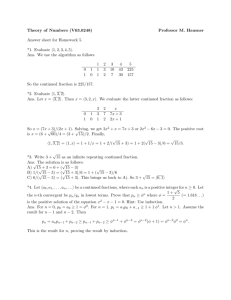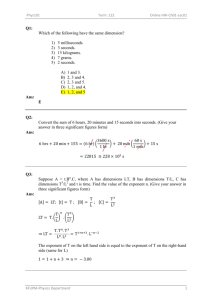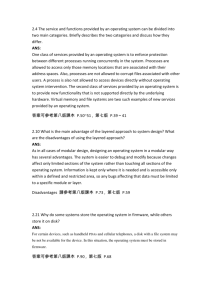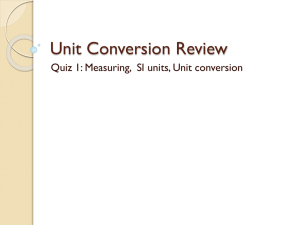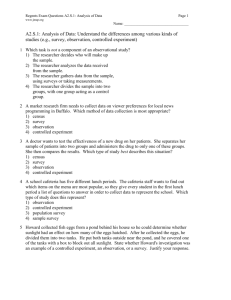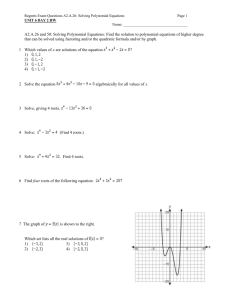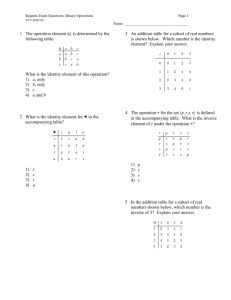Unit 3 - Chp 7 - Test Bank
advertisement
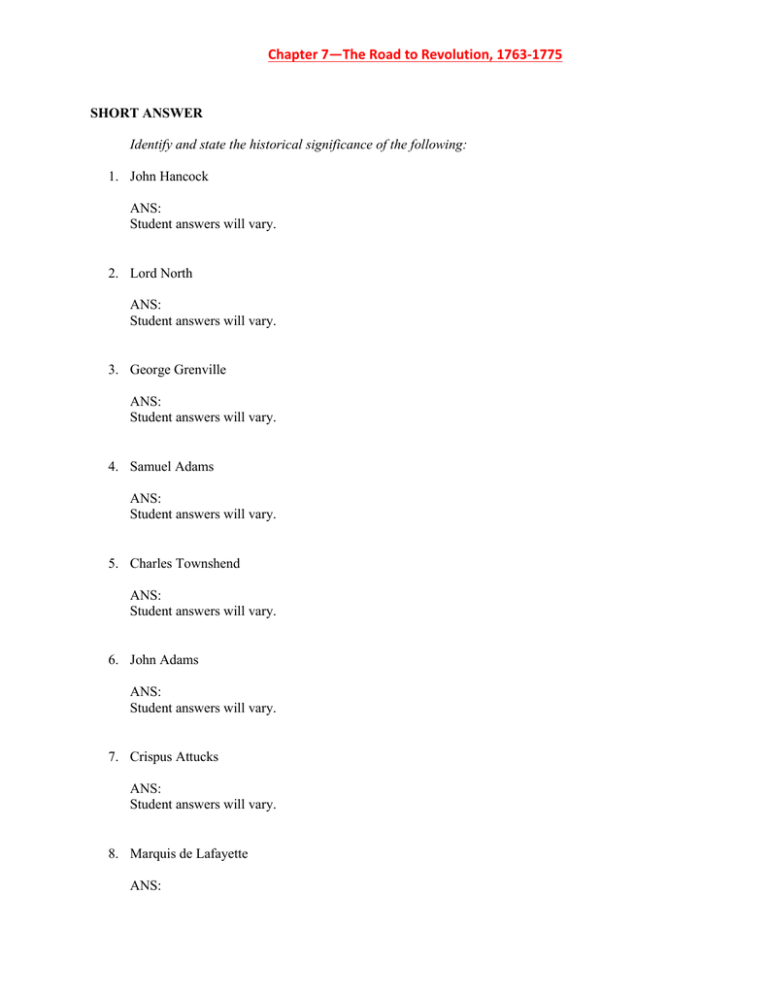
Chapter 7—The Road to Revolution, 1763-1775 SHORT ANSWER Identify and state the historical significance of the following: 1. John Hancock ANS: Student answers will vary. 2. Lord North ANS: Student answers will vary. 3. George Grenville ANS: Student answers will vary. 4. Samuel Adams ANS: Student answers will vary. 5. Charles Townshend ANS: Student answers will vary. 6. John Adams ANS: Student answers will vary. 7. Crispus Attucks ANS: Student answers will vary. 8. Marquis de Lafayette ANS: Student answers will vary. 9. King George III ANS: Student answers will vary. 10. Thomas Hutchinson ANS: Student answers will vary. 11. Abigail Adams ANS: Student answers will vary. 12. Benjamin Franklin ANS: Student answers will vary. 13. Edmund Burke ANS: Student answers will vary. 14. Adam Smith ANS: Student answers will vary. Define and state the historical significance of the following: 15. mercantilism ANS: Student answers will vary. 16. "No taxation without representation" ANS: Student answers will vary. 17. nonimportation agreement ANS: Student answers will vary. 18. internal/external taxation ANS: Student answers will vary. 19. "virtual" representation ANS: Student answers will vary. 20. boycott ANS: Student answers will vary. 21. "enumerated" products ANS: Student answers will vary. Describe and state the historical significance of the following: 22. Board of Trade ANS: Student answers will vary. 23. Sons of Liberty & Daughters of Liberty ANS: Student answers will vary. 24. Quebec Act ANS: Student answers will vary. 25. Navigation Acts ANS: Student answers will vary. 26. Declaratory Act ANS: Student answers will vary. 27. First Continental Congress ANS: Student answers will vary. 28. Sugar Act ANS: Student answers will vary. 29. Townshend Acts ANS: Student answers will vary. 30. Quartering Act ANS: Student answers will vary. 31. Boston Massacre ANS: Student answers will vary. 32. The Association ANS: Student answers will vary. 33. Stamp Act ANS: Student answers will vary. 34. committees of correspondence ANS: Student answers will vary. 35. Hessians ANS: Student answers will vary. 36. admiralty courts ANS: Student answers will vary. 37. Boston Tea Party ANS: Student answers will vary. 38. Loyalists ANS: Student answers will vary. 39. Stamp Act Congress ANS: Student answers will vary. 40. Intolerable Acts ANS: Student answers will vary. 41. British East India Company ANS: Student answers will vary. 42. Battle of Lexington and Concord ANS: Student answers will vary. MULTIPLE CHOICE 43. Change in colonial policy by the British government that helped precipitate the American Revolution involved a. removing British troops from American soil. b. beginning a war with Spain. c. removing the majority of the British navy from American waters. d. compelling the American colonists to shoulder some of the financial costs of the empire. e. allying with the French. ANS: D REF: p. 113 44. When it came to the Revolution, it could be said that the American colonists were a. eager revolutionaries. b. up until the end wanting more than the "rights of Englishmen." c. little concerned about economics. d. clearly opposed to tightening commercial bonds to the British. e. reluctant revolutionaries. ANS: E REF: p. 113 45. In a broad sense, America was a. a revolutionary force from the day of its discovery by Europeans. b. a place that nurtured a love for Britain. c. completely dependent on Britain for economic support. d. a place where no new ideas took shape. e. essentially a conservative society. ANS: A REF: p. 113 46. The American colonial exponents of republicanism argued that a just society depends on a. a powerful central government. b. a weak army. c. a strong aristocratic tradition. d. support for hierarchical institutions. e. a willingness to subordinate private interests to the common good. ANS: E REF: p. 113 47. Republicans looked to the models of the ____ for examples of a just society. a. Egyptians b. Greeks and Romans c. Middle Ages d. Renaissance e. Enlightenment ANS: B REF: p. 113 48. Republican belief held that the stability of society and the authority of the government a. rested with the legislature. b. depended on a strong hierarchical culture. c. rested with a strong monarchy. d. rested on an interdependence of all citizens. e. depended on the virtue of its citizenry. ANS: E REF: p. 113 49. The radical whigs feared a. too much democracy. b. a written constitution. c. the arbitrary power of the monarchy. d. a too powerful parliament. e. republicanism. ANS: C REF: p. 113 50. Identify the statement that is false. a. Royal titles were unknown in the American colonies. b. Property ownership and political participation were relatively accessible. c. The Americans were dependent on the British officials in London to run their affairs. d. Republican and Whig ideas predisposed the Americans to be more aware of threats to their rights. e. Distance weakens authority, great distance weakens authority greatly. ANS: C REF: p. 113-114 51. Not one of the original thirteen colonies except ____ was formally planted by the British government. a. Virginia b. Maryland c. South Carolina d. Georgia e. Massachusetts ANS: D REF: p. 114 52. The founding of the American colonies by the British was a. accomplished in a well-planned fashion. b. based on the high-minded aspirations of groups such as the Puritans and the Quakers. c. undertaken by the government in every case. d. undertaken in a haphazard manner. e. rarely undertaken by trading companies or religious groups. ANS: D REF: p. 114 53. Mercantilists believed that a. a mother country needed to import more goods than it exported. b. power came from a small colonial empire. c. the mother country produced raw materials and colonies produced the finished product. d. a country's economic wealth could be measured by the amount of gold and silver in its treasury. e. colonies drained a country of its resources. ANS: D REF: p. 114 54. Under mercantilist doctrine, the American colonies were expected to do all of the following except a. supply Britain with products such as tobacco, sugar and ships' masts. b. become economically self-sufficient as soon as possible. c. furnish ships, seamen, and trade to bolster the strength of the Royal Navy. d. provide a market for British manufactured goods. e. refrain from exporting woolen cloth. ANS: B REF: p. 114 55. The first Navigation Laws were designed to a. help colonists get the best possible price for their trade goods. b. eliminate Dutch shippers from the American carrying trade. c. foster a colonial economy that would offer healthy competition with Britain's. d. encourage agricultural experimentation in the colonies. e. support the mapping of the Atlantic trade routes. ANS: B REF: p. 114 56. The British Parliament enacted currency legislation that was intended primarily to benefit a. Virginia tobacco planters. b. British merchants. c. New England merchants. d. backwoods farmers. e. the Crown. ANS: B REF: p. 114 57. The British Crown's royal veto of colonial legislation a. was used frequently to overturn laws passed in colonial assemblies. b. prohibited colonists from conducting the slave trade. c. was what finally provoked the War of Independence. d. was used sparingly by the British Parliament. e. was opposed by many members of the British Parliament. ANS: D REF: p. 115 58. Under the mercantilist system, the British government reserved the right to do all of the following regarding the American colonies except a. prevent the colonies from developing militias. b. restrict the passage of lax bankruptcy laws. c. nullify any colonial legislation deemed bad for the mercantilist system. d. restrain the colonies from printing paper currency. e. enumerate products that must be shipped to Britain. ANS: A REF: p. 114-115 59. Before 1763, the Navigation Laws a. were enforced heavily in the American colonies and were very effective. b. hurt Great Britain more than the American colonies. c. were a great burden to only India. d. discouraged smuggling by American colonial merchants. e. were only loosely enforced in the American colonies. ANS: E REF: p. 115 60. Despite the benefits of the mercantile system, the American colonists disliked it because it a. forced the South into a one-crop economy. b. favored the northern over the southern colonies. c. forced economic initiative on the colonists. d. made them feel used and kept them in a state of perpetual economic adolescence. e. forced them to sell their products to other countries at a reduced price. ANS: D REF: p. 115 61. In some ways, the Navigation Laws and mercantilist system were a burden to certain colonists because a. northern merchants derived greater benefit from the system than did southern planters. b. those colonists were heavily taxed to help provide financing for the Royal Navy, which protected colonial and British trade. c. they stifled economic initiative. d. Britain had the only European empire based on mercantilist principles. e. they gave greater benefits to slaveholders. ANS: C REF: p. 115 62. All of the following were direct benefits reaped by the Americans from the mercantile system of Britain except a. British allowed the Americans to freely trade with other countries and compete on the open market. b. London paid high prices for ship parts to American producers. c. Virginia tobacco planters enjoyed a monopoly in the British market. d. protection of the world's mightiest navy and army without a penny of cost. e. some British merchants were not allowed to compete with the American colonial merchants. ANS: A REF: p. 115 63. A new relationship between Britain and its American colonies was initiated in 1763 when ____ assumed charge of colonial policy. a. Charles Townshend b. George Grenville c. Lord North d. William Pitt e. King George III ANS: B REF: p. 115 64. Match each act below with the correct description. A. Sugar Act B. Stamp Act C. Declaratory Act a. b. c. d. e. A-3, B-2, C-l A-1, B-4, C-3 A-1, B-4, C-2 A-4, B-1, C-2 A-2, B-1, C-4 1. 2. 3. 4. first British law intended to raise revenues in the colonies asserted Parliament's absolute power over the colonies required colonists to lodge British troops in their homes generated the most protest in the colonies. ANS: C REF: p. 115-118 65. The first law ever passed by Parliament for raising tax revenues in the colonies for the crown was the a. Stamp Act. b. Declaratory Act. c. Townshend Acts. d. Quartering Act. e. Sugar Act. ANS: E REF: p. 115-116 66. The British Parliament passed the Stamp Act to a. raise money to support new military forces needed for colonial defense. b. punish the American colonists. c. reduce the number of printed documents in America. d. enable tax collectors to become wealthy. e. raise taxes to a higher level than in Britain. ANS: A REF: p. 116 67. Passage of the Sugar Act and the Stamp Act a. led many colonists to believe that the British were expanding colonial freedom. b. convinced many colonists that the British were trying to take away their historic liberty. c. resulted in fewer laws being passed by Parliament regarding the colonies. d. exemplified to many colonists the difference between legislation and taxation. e. required action by each colonial legislature. ANS: B REF: p. 116 68. Unlike the ____ Act, the ____ Act and the ____ Act were both indirect taxes on trade goods arriving in American ports. a. Townshend, Stamp, Sugar b. Stamp, Sugar, Townshend c. Stamp, Quartering, Townshend d. Declaratory, Stamp, Sugar e. Quartering, Stamp, Sugar ANS: B REF: p. 116-118 69. Arrange the following events in chronological order: (A) Sugar Act, (B) Declaratory Act, (C) Stamp Act, and (D) repeal of the Stamp Act. a. A, C, D, B b. C, A, D, B c. C, B, A, D d. B, A, C, D e. A, B, D, C ANS: A REF: p. 116-118 70. Colonists objected to the Stamp Act because a. it was a very expensive tax. b. they believed it could not be repealed. c. Parliament passed the tax, not the colonists. d. they opposed all taxes. e. they wanted their independence. ANS: C REF: p. 116 71. Colonists responded to Grenville's various acts in all of the following ways except a. they considered the Stamp and other acts as a sign of fiscal aggression. b. they protested paying any duties required by the acts in an effort to force their repeal. c. they rejected the need to fund a British army in the colonies. d. they marched past Grenville's home and threatened to burn him in effigy. e. they feared the real reason for a British army was to keep colonists in line. ANS: D REF: p. 116 72. The Quartering Act required that colonists a. pay one quarter of their income to the British crown. b. provide housing and food for British troops. c. ship all of their export goods through England. d. try those accused of theft in admiralty courts. e. None of these ANS: B REF: p. 116 73. When colonists shouted "No taxation without representation," they were denying Parliament's power to a. legislate for the colonies in any matter whatsoever. b. levy revenue-raising taxes on the colonies. c. enforce the old Navigation Laws. d. regulate trade in the empire. e. choose colonial legislators who would pass taxes. ANS: B REF: p. 116 74. Women supported protests against the Stamp Act in all of the following ways except a. assembling in public to hold spinning bees. b. making homespun cloth to replace British textiles. c. boycotting consumer goods imported from England. d. signing petitions. e. cooking lamb chops for their families. ANS: E REF: p. 117 75. Virtual representation meant that a. almost all British subjects were represented in Parliament. b. every member of Parliament represented all British subjects everywhere. c. colonists could elect their own representatives to Parliament. d. Parliament could pass virtually all types of legislation except taxes. e. each member of Parliament represented only people in his district. ANS: B REF: p. 116 76. Colonists responded to the hated Stamp Act in all of the following ways except a. convening a colonial congress to request repeal of the act. b. boycotting British goods. c. via violence in several colonial towns. d. wearing woolen clothes made with colonial textiles vs. British cloth. e. having colonial legislatures issue a court mandate forbidding the enforcement of the act. ANS: E REF: p. 117 77. The colonists took the Townshend Acts less seriously than the Stamp Act because a. they saw the futility of resistance. b. smuggling was nearly impossible. c. it was a direct tax. d. the items taxed were rarely used. e. they were light and indirect. ANS: E REF: p. 118 78. As a result of American opposition to the Townshend Acts a. British officials sent regiments of troops to Boston to restore law and order. b. the port of Boston was closed. c. Americans killed several British soldiers in the Boston Massacre. d. Parliament repealed all of the taxes levied under this legislation. e. Prime Minister Townshend was forced to resign. ANS: A REF: p. 119 79. Arrange these events in chronological order: (A) Boston Massacre, (B) Townshend Acts, (C) Tea Act, and (D) Intolerable Acts. a. A, B, C, D b. D, B, C, A c. C, B, D, A d. B, A, C, D e. A, C, D, B ANS: D REF: p. 118-122 80. Match each individual on the left with the correct description. A. Samuel Adams B. John Adams C. Crispus Attucks 1. 2. 3. 4. a. b. c. d. e. a casualty of the Boston Massacre a foreign volunteer who drilled American troops during the War of Independence a pamphleteer who first organized committees to exchange ideas and information on resisting British policy a Massachusetts politician who opposed the moderates' solution to the imperial crisis at the First Continental Congress A-4, B-3, C-2 A-3, B-4, C-1 A-2, B-4, C-2 A-2, B-1, C-3 A-4, B-1, C-2 ANS: B REF: p. 119-120 81. The tax on tea was retained when the Townshend Acts were repealed because a. Parliament believed the colonists would not object. b. the money was needed to support troops. c. it kept alive the principle of parliamentary taxation. d. it was the only tax passed by the colonists. e. colonial governors requested it. ANS: C REF: p. 120 82. The local committees of correspondence organized by Samuel Adams a. promoted his bid to become governor of Massachusetts. b. promoted independent action in each colony to support the British. c. kept opposition to the British alive, through exchange letters. d. served as a precursor to the United States Postal Service. e. led to the Boston Massacre. ANS: C REF: p. 120 83. In 1773, ____ led the way by creating the first intercolonial committee of correspondence. a. Virginia b. Maryland c. Massachusetts d. Georgia e. Rhode Island ANS: A REF: p. 120 84. Arrange the following events in chronological order: (A) clash at Lexington and Concord, (B) meeting of the First Continental Congress, (C) Quebec Act, and (D) Boston Tea Party. a. C, D, A, B b. B, A, C, D c. D, C, B, A d. A, B, D, C e. A, D, C, B ANS: C REF: p. 121-124 85. Which of the following statements is false? a. By 1773, it was clear that a colonial rebellion was inevitable. b. British officials granted the British East India Company a monopoly in the colonies to prevent its bankruptcy. c. Anger at the tea tax led to mass efforts to turn cargo ships around in New York, Philadelphia, and Annapolis. d. Bostonians dressed as Indians dumped 342 chests of tea into Boston harbor in protest of the tea tax. e. Some Bostonians supported the Boston Tea Party; others disagreed with the destruction of property. ANS: A REF: p. 121 86. When Parliament passed the Tea Act, colonists a. rejoiced that Parliament had seemingly accepted the American definition of representation. b. suspected that it was a trick to get them to violate their principle of "No taxation without representation." c. immediately called the First Continental Congress into session. d. avoided the tax on tea by buying their tea directly from the British East India Company. e. gave up tea and turned to coffee. ANS: B REF: p. 121 87. The Boston Tea Party of 1773 was a. an isolated incident. b. directed only at the British East India Company. c. not the only such protest to occur. d. supported by friends of America in Britain. e. the result of the Intolerable Acts. ANS: C REF: p. 121 88. The most drastic measure of the Intolerable Acts was the a. Quartering Act. b. Quebec Act. c. Sugar Act. d. Courts Act. e. Boston Port Act. ANS: E REF: p. 122 89. The Quebec Act a. outlawed Catholicism in British Quebec. b. suspended representative assemblies and trials by jury. c. restricted Quebec's boundaries to the area north of the Great Lakes. d. was generally ignored by the thirteen seaboard colonies because it had little effect on their relations with Britain. e. granted Quebec a representative assembly and trial by jury. ANS: B REF: p. 122 90. The Quebec Act was especially unpopular in the American colonies because it did all of the following except a. turn an extensive amount of territory over to Catholic control. b. affect many colonies, not just Massachusetts. c. deny the French the right to retain many of their old customs. d. alarm land speculators, who saw a huge area snatched from their grasp. e. set a dangerous precedent against jury trials. ANS: C REF: p. 122 91. The most memorable of the responses to the Intolerable Acts was a. a rejection of the Quebec Act by the colonial legislatures. b. the summoning of the First Continental Congress in 1774. c. the Boston Massacre. d. the closing of Boston Harbor by the Massachusetts colonial assembly. e. call for a complete break with Great Britain and a declaration of independence. ANS: B REF: p. 122 92. The First Continental Congress was called in order to a. consider ways of redressing colonial grievances against Britain. b. become a legislative body. c. write the Declaration of Independence. d. decide which of Parliament's taxes the colonies would and would not pay. e. help implement provisions of the Quebec Act. ANS: A REF: p. 122-123 93. The First Continental Congress a. was attended by delegates from each of the thirteen colonies. b. adopted a moderate proposal for establishing a kind of home rule for the colonies under British direction. c. made a ringing declaration of America's independence from Britain. d. called for a complete boycott of British goods. e. adjourned shortly after convening. ANS: D REF: p. 123 94. As a result of Parliament's rejection of the petitions of the Continental Congress a. Americans reluctantly obeyed the British laws. b. fighting and bloodshed took place, and war began. c. Sam Adams and John Hancock were arrested. d. America sent new petitions to Parliament. e. Ben Franklin returned to the colonies since his efforts failed. ANS: B REF: p. 123-124 95. As the War for Independence began, Britain had the advantage of a. overwhelming national wealth and naval power. b. an alliance with Spain and Holland. c. a well-organized and united home government and population. d. first-rate generals and a well-supplied professional army. e. knowing the terrain and geography of the colonies. ANS: A REF: p. 124 96. All of the following were weaknesses of the British military during the War for Independence except a. second-rate officers. b. soldiers who were incapable of fighting effectively. c. the need to keep many soldiers in Europe in case of trouble. d. long supply lines. e. brutal treatment of their soldiers. ANS: B REF: p. 125 97. Many Whigs in Britain hoped for an American victory in the War for Independence because they a. favored French domination of North America. b. were strongly pacifist. c. feared that if George III triumphed, his rule at home might become tyrannical. d. rejected colonialism. e. opposed the mercantilist system. ANS: C REF: p. 125 98. As the War for Independence began, the colonies had the advantage of a. highly reliable and well-supplied troops. b. potential aid from the Armed Neutrality League. c. a well-organized, strongly committed, and united population. d. many outstanding civilian and military leaders. e. able naval leaders. ANS: D REF: p. 125 99. The colonists faced all of the following weaknesses in the War for Independence except a. poor organization. b. sectional jealousy, which constantly interfered with the appointment of military leaders. c. great difficulties in raising money to support the army. d. the use of numerous European officers. e. a weak central authority running the war effort. ANS: D REF: p. 125 | p. 128 100. By the end of the War for Independence a. the majority of Americans supported independence with selfless devotion. b. America had an army larger than Britain's. c. the American military no longer needed foreign assistance. d. a few thousand American regular troops were finally whipped into shape. e. America had built a strong navy. ANS: D REF: p. 128 101. Which of the following is not a true statement about women's roles during the Revolution? a. They ran businesses while the men fought. b. Many were camp followers, who cooked, cleaned and sewed for the troops. c. They received money and rations for services provided to troops. d. Some dressed as men and served in battle. e. Many women urged husbands and sons to stay home and safeguard their families and property. ANS: E REF: p. 128 102. African Americans during the Revolutionary War a. fought for both the Americans and the British. b. fought only for the British. c. fought only for the Americans. d. supported neither side, as both enslaved them. e. seized the opportunity to gain their freedom by running away to Barbados. ANS: A REF: p. 129 103. Regarding American independence a. a majority of Americans supported the cause selflessly. b. most of the American business community sacrificed profit for victory. c. France gave little assistance. d. only a select minority supported independence with selfless devotion. e. Spain was in total opposition. ANS: D REF: p. 129 MULTIPLE RESPONSE 104. The Navigation Laws required that a. all commerce to and from the colonies be carried only on British vessels. b. European goods going to the colonies had first to put in at a British port and pay duties. c. certain goods produced in the colonies, like tobacco, be shipped only to Britain. d. the colonies develop as quickly as possible the manufacturing of cloth and iron products for themselves. e. the colonies print their own currency. ANS: A, B, C REF: p. 114 105. To a degree, the Navigation Laws were beneficial to colonists because a. colonists were paid subsidies for producing ships' parts and stores. b. tobacco growers were guaranteed a monopoly of the British market for their crop. c. colonial trading ships were protected by the Royal Navy. d. colonists did not have to deal with British intermediaries when marketing their goods. e. they helped create a surplus of money. ANS: A, B, C REF: p. 115 106. Colonists disliked the new British policy of trying accused tax-policy offenders in admiralty courts because the offenders a. would be assumed guilty unless they could prove themselves innocent. b. would be taken to England for trial. c. could not present witnesses in their own defense. d. would not receive a jury trial. e. could not have an attorney. ANS: A, D REF: p. 116 107. George Grenville responded to American protests against his policies by asserting that a. colonists were represented in Parliament even if they did not think so. b. the power of Parliament was absolutely supreme in the empire. c. the concept of virtual representation was invalid. d. British subjects could be taxed without their being represented in Parliament. e. he would remove British troops in America if their protests stopped. ANS: A, B REF: p. 116 108. The Townshend Acts a. were more vigorously protested by colonists than was the Stamp Act. b. were designed to raise revenue to help pay the salaries of royal governors. c. failed to produce the volume of revenue expected. d. were repealed by Parliament. e. were reluctantly accepted by the colonists. ANS: B, C, D REF: p. 118 109. In response to the Boston Tea Party, Parliament a. closed Boston harbor. b. restricted town meetings in New England. c. required that the perpetrators of the Boston Tea Party be taken to England for trial. d. repealed the Tea Act. e. passed the Townshend Acts. ANS: A, B, C REF: p. 121-122 ESSAY 110. Explain the relationship between mercantilism, the Navigation Laws, and British efforts to create an administrative structure for their empire after 1696. ANS: Student answers will vary. 111. Given that the Quebec Act did not apply to the thirteen seaboard colonies, why did the act create such a stir of protest among them? ANS: Student answers will vary. 112. Compare and contrast the advantages and disadvantages of the British and the colonists, respectively, as the American Revolutionary War began? What would Britain have to do to win? What would the colonists have to do to win? ANS: Student answers will vary. 113. What does the phrase point of no return mean to you? Identify that point in colonial-British relations between 1760 and 1776 and explain why you picked that event/date. ANS: Student answers will vary. 114. Write your definition of conspiracy. Then use this definition to argue that the colonists were or were not victims of a British conspiracy to rob them of their liberties. ANS: Student answers will vary. 115. Both the British and the colonists were devoted to the principle of "No taxation without representation." To what extent did both taxation and representation become major sources of controversy between the colonists and Parliament? ANS: Student answers will vary. 116. In what ways were the mercantilist policies of the British burdensome to the colonists? In what ways were they beneficial? From this comparison, draw a conclusion about the effects of mercantilism and the Navigation Laws on British-colonial relations up to 1763. ANS: Student answers will vary. 117. Which of the following do you think was most responsible for the conflict between Britain and its American colonies: the ineptness of parliamentary leadership, the colonists' behavior, the highhandedness of King George III, the British mercantilist system and Navigation Laws, or the actions of British officials in the colonies? Justify your choice. ANS: Student answers will vary. 118. List the following in order of their importance to colonial protest: pamphlets, boycotts, mob action, and committees of correspondence. Justify your ranking. ANS: Student answers will vary. 119. It might be said that it was the British who were revolutionaries in 1763 and the colonists who were conservatives attempting to preserve the status quo. Explain. ANS: Student answers will vary. 120. Explain the following quote, "Insurrection of thought usually precedes insurrection of deed." What does this mean? In what ways is this generalization an accurate description of the coming of the American Revolutionary War? ANS: Student answers will vary. 121. Create a scenario for the period 1763-1776 to demonstrate that the American Revolutionary War and colonial independence from Great Britain were not inevitable. ANS: Student answers will vary. 122. Explain the following quote, "In the American wilderness, they encountered a world that was theirs to make afresh." ANS: Student answers will vary.
